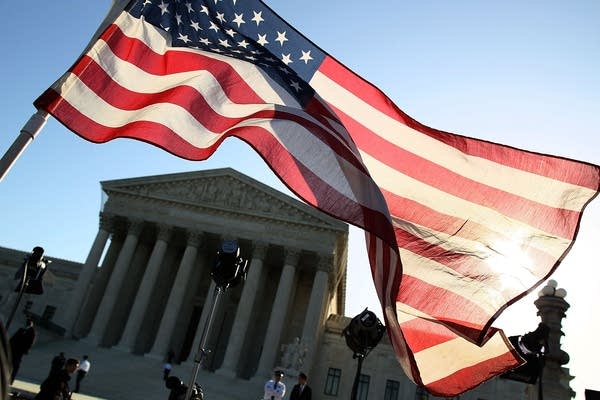Minn. lawmakers anticipate landscape after health ruling
Go Deeper.
Create an account or log in to save stories.
Like this?
Thanks for liking this story! We have added it to a list of your favorite stories.

WASHINGTON -- These days many Democrats on Capitol Hill appear glum.
They're mentally preparing for the possibility that as early as Monday the Supreme Court's conservative majority could strike down a provision at the center of the 2010 federal health care overhaul that requires all Americans to buy health insurance.
U.S. Rep. Keith Ellison is among those who is concerned that the court will rule that the mandate is unconstitutional.
"I'm hoping the Supreme Court will do the right thing, but if they don't, it's not fatal," said Ellison, who represents Minnesota's 5th District. "There will still be lots of parts of the bill that stay up."
Turn Up Your Support
MPR News helps you turn down the noise and build shared understanding. Turn up your support for this public resource and keep trusted journalism accessible to all.
He argues that other parts of the law should remain even if the mandate goes.
They include a popular provision that bars insurance companies from rejecting people with pre-existing conditions and the creation of health insurance exchanges that will allow people to easily compare insurance plans.
But Republican U.S. Rep. John Kline of Minnesota's 2nd District says that if the court rules against any part of the bill, the GOP will try to scrap the entire thing.
"We in the Congress need to move to repeal completely whatever is left because it's very hard to make any reforms while you still have lingering pieces of the law," Kline said.
Of course, the Democratic-controlled Senate and President Barack Obama are unlikely to agree to any plan to repeal the rest of the law.
"I'm hoping the Supreme Court will do the right thing, but if they don't, it's not fatal."
Kline, who chairs the House Education and Workforce Committee that shares jurisdiction over some health care issues, concedes that addressing the many failings of the health insurance system will be difficult in a presidential election year.
But if the high court strikes down part of the law, he said, House Republicans would offer some piecemeal alternatives.
"I don't think that we will be looking into a comprehensive replacement for this," Kline said of the health care law. "I think that's the wrong thing to do. We will, I'm sure, introduce pieces of legislation that we think address some of the shortcomings of the old system."
Some proposals include creating high-risk insurance pools for those who have trouble buying health care on their own and allowing small businesses and trade associations to band together when buying insurance.
As she stood on the steps of the House of Representatives last week, Minnesota's most vocal critic of the law, U.S. Rep. Michele Bachmann, pointed in the direction of the Supreme Court and said she had high expectations if the law is struck down.
"We in the Congress need to move to repeal completely whatever is left because it's very hard to make any reforms while you still have lingering pieces of the law."
"Then all of a sudden insurance companies will be lowering their insurance prices because they know they won't be forced to offer these very expensive requirements in the future," she said.
Bachmann has made many claims about the health care law that fact checkers have found false. But Jean Abraham, a health care economist at the University of Minnesota, said in this case, Bachmann's claim may be somewhat accurate.
"They will probably go down slightly," she said of insurance rates.
Abraham said repealing the law might temporarily lower insurance rates, but in the long run, health care costs will continue to grow faster than wages or the overall economy.
Economists believe longer life spans; the aging population; new drugs and medical technology; a rise in chronic diseases; and high administrative costs are all making health care more expensive.
Bachmann also made an even bolder claim about the potential effect of a Supreme Court decision to strike down the law.
"We'll also see employers begin to hire more people," Bachmann said. "We'll see more job creation."
Abrahamson found that difficult to justify.
"There's no empirical research to date that can verify that claim," she said.
In fact, Abraham said recent research from Massachusetts, which has had a statewide law similar to the federal effort in place since 2006, doesn't show any impact of its law on job growth.
Whatever the court decides, the federal government will have a big role in regulating the health insurance industry, said U.S. Rep. Tim Walz, a Democrat who represents southern Minnesota.
"The Supreme Court will make their decision as they always do," Walz said. "The way we're approaching this is it doesn't change the fact that our health care system is far too expensive, it leaves far too many people out, and it puts far too much pressure on working families and employers."
If the court eliminates parts of the law and the November elections produce more gridlock in Washington, experts say efforts to change the health care system will shift from the federal level to the states.



